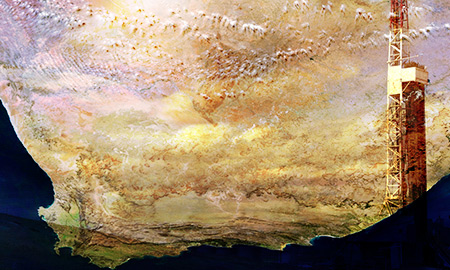A handful of international oil and gas companies are hoping that South Africa finally gets around to awarding shale gas exploration permits in the country's Karoo basin this year.
Rolling blackouts in South Africa in May of this year were a reminder, not just of the precarious nature of the country's electricity-generating infrastructure but on how reliant it is on coal.
South Africa's main power provider Eskom appeared to have been making some progress coping with the electricity demand in recent times, with May's power cuts being the worst for six years. However, this time the blackouts were caused by a combination of a large amount of Eskom's generating capacity being taken offline for maintenance and more than a week of continuous rain dampening the stockpiles of coal the company needs to fuel its power stations.
Yet South Africa might have a solution to its overreliance on coal in the shape of large shale gas deposits that can be found across the country.
The most recent "World Shale Gas Resources" report from the U.S. Energy Information Administration (June 2013) estimates South Africa as having 390 trillion cubic feet of technically-recoverable shale gas – making it number eight on the list of countries with the world's largest shale gas resources.
In spite of the country's large shale gas resources – which exist mainly in the semi-desert Karoo region – being known about for some time, the South African government introduced a moratorium on licensing and exploring for shale resources in April 2011. The reason for the move was because of concerns about the environmental effects of hydraulic fracturing (fracking) and water usage.
Eventually, in September 2012, the South African government lifted the moratorium, which was followed by international oil and gas companies – most notably Royal Dutch Shell plc – submitting applications to explore for and develop shale gas resources in the Karoo Basin.
The lifting of the moratorium came with the proviso that pending applications for exploration rights would not be processed and awarded until regulations regarding unconventional exploration were published. The regulations were finally published in October 2013, which means that companies who have made applications for exploration permits now expect these to be awarded by the end of this year.
Proposed Legislation Could Have a 'Chilling Effect'
But another potential stumbling block for South African shale gas development occurred earlier this year when proposed amendments to the country's mineral resources legislation threatened to put off oil and gas investors. The proposed bill, as it stands, would have allowed the South African government to hold a 20-percent free carry in any hydrocarbon projects, both onshore and offshore, while also giving it the right to acquire the remaining 80 percent of these projects at a predetermined price.
At the time the measures were criticized by the Offshore Petroleum Association of South Africa, which said they would have "a chilling effect" on investment in the high risk and capital-intensive oil and gas industry. This criticism has since been noted by South Africa's new mineral resources minister, Ngoako Ramatlodhi, who told the UK's Financial Times in mid-June that he has already advised the country's president not to sign the controversial amendments.
Clarity is still required on what companies who invest in South African shale gas exploration and development can expect to yield in terms of reward for their risk, but the progress outlined above appears to indicate that South Africa is edging closer to developing its shale gas resources and a serious shale gas industry.
If this happens, it could lead to the creation of between 300,000 and 700,000 jobs in South Africa over a 25-year period due to the boost that cheap shale gas would give the country's economy, according to Johannesburg-based economic consultancy Econometrix. This estimate is based on just 48.5 trillion cubic feet of shale gas being developed.
Econometrix argues that not only would shale gas producers, consumers and the government (via tax revenues) benefit from the development of the industry but that there would be a knock-on effect for energy-intensive industries thanks to lower input costs.
Companies interested in developing the Karoo shale include not only Shell but also France's Total S.A., Exxon Mobil Corp. and Chevron Corp. Chevron signed a joint venture deal in December 2012 with junior energy firm Falcon Oil & Gas Ltd., which has a Technical Cooperation Permit giving it exclusive rights to obtain an exploration permit covering 7.5 million acres in the southern part of the Karoo basin.
The next step will be for the South African government to begin awarding shale gas exploration permits to oil and gas firms. Falcon believes that this will take place at some point during the remainder of 2014.
RIGZONE
